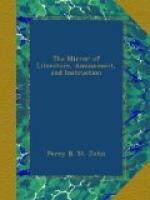The battle, which was fought October 17, 1346, lasted only three hours, but was uncommonly destructive. The English archers, who were in front, were at first thrown into confusion, and driven back; but being reinforced by a body of horse, repulsed their opponents, and the engagement soon became general. The Scottish army was entirely defeated, and the king himself made prisoner; though previous to the fight he is said to have regarded the English with contempt, and as a raw and undisciplined host, by no means competent to resist the power of his more hardy veterans.
“Amid repeated charges, and the most dispiriting slaughter by the continuous discharge of the English arrows, David showed that he had the courage, though not the talents, of his father (Robert Bruce). He was twice severely wounded with arrows, but continued to encourage to the last the few of his peers and officers who were still fighting around him."[8] He scorned to ask quarter, and was taken alive with difficulty. Rymer says, “The Scotch king, though he had two spears hanging in his body, his leg desperately wounded, and being disarmed, his sword having been beaten out of his hand, disdained captivity, and provoked the English by opprobrious language to kill him. When John Copeland, who was governor of Roxborough Castle, advised him to yield, he struck him on the face with his gauntlet so fiercely, that he knocked out two of his teeth. Copeland conveyed him out of the field as his prisoner. Upon Copeland’s refusing to deliver up his royal captive to the queen (Philippa), who stayed at Newcastle during the battle, the king sent for him to Calais, where he excused his refusal so handsomely, that the king sent him back with a reward of 500_l._ a year in lands, where he himself should choose it, near his own dwelling, and made him a knight banneret."[9]
Hume states Philippa to have assembled a body of little more than 12,000 men, and to have rode through the ranks of her army, exhorting every man to do his duty, and to take revenge on these barbarous ravagers. “Nor could she be persuaded to leave the field till the armies were on the point of engaging. The Scots have often been unfortunate in the great pitched battles which they have fought with the English: even though they commonly declined such engagements where the superiority of numbers was not on their side; but never did they receive a more fatal blow than the present. They were broken and chased off the field: fifteen thousand of them, some historians say twenty thousand, were slain; among whom were Edward Keith, Earl Mareschal, and Sir Thomas Charteris, Chancellor: and the king himself was taken prisoner, with the Earls of Sutherland, Fife, Monteith, Carrick, Lord Douglas, and many other noblemen.” The captive king was conveyed to London, and afterwards in solemn procession to the Tower, attended by a guard of 20,000 men, and all the city companies in complete pageantry; while “Philippa crossed the sea at Dover, and was received in the English camp before Calais, with all the triumph due to her rank, her merit, and her success.” These indeed were bright days of chivalry and gallantry.




